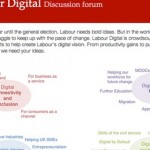 What began with movements such as the participatory budgeting/democracy concept has flowered in the crowdsourced era we now live in, which gives organizations much greater opportunity to tap into the wisdom and insights of their followers. Indeed, such is the potential that the UK innovation charity NESTA suggested that this year will see the rise of the crowdsourced politician.
What began with movements such as the participatory budgeting/democracy concept has flowered in the crowdsourced era we now live in, which gives organizations much greater opportunity to tap into the wisdom and insights of their followers. Indeed, such is the potential that the UK innovation charity NESTA suggested that this year will see the rise of the crowdsourced politician.
…In response, existing political institutions have sought to improve feedback between the governing and the governed through the tentative embrace of crowdsourcing methods, ranging from digital engagement strategies, open government challenges, to the recent stalled attempt to embrace open primaries by the Conservative Party (Iceland has been braver by designing its constitution by wiki). Though for many, these efforts are both too little and too late. The sense of frustration that no political party is listening to the real needs of people is probably part of the reason Russell Brand’s interview with Jeremy Paxman garnered nine million views in its first month on YouTube.…
There has undoubtedly been much consternation amongst the political classes about the horrid turnout amongst voters in recent elections, and this may even have prompted many to question whether an alternative approach is needed. Participatory democracy offers a much more inclusive means of politics because it gives people a say in how their money is spent and how decisions are made, with that input solicited all the time rather than at election time.
Suffice to say, the latest attempts by the Labour Party to crowdsource policy ideas are not of that ilk at all. Their new website offers users the opportunity to suggest policy ideas to the party. These ideas are then voted up or down by others, with the most popular then considered by the party for implementation.
As a platform, I think it kinda misses the point in a number of key ways. Firstly, it’s offering people some kind of input, but it’s only doing so because an election is looming, and the party want to solicit ideas that they no doubt hope will help them to win that election. It’s a far cry from the participatory budgeting and democracy projects that give people much greater say and involvement throughout the electoral cycle.
This platform instead seems more geared to benefiting the politicians than it does the people, which is largely the reason why so many people have switched off of the political process as a whole.
My second beef with it is that it still doesn’t offer anything in the way of freedom, because despite involving people in politics to an extent, the underlying system will not have changed at all. It’s likely therefore that any policies proposed and implemented via this site will still see a minority of the electorate imposing their views on the rest. In that sense it’s no different to the kind of rent seeking that is so corrosive under the current system.
So, whilst it’s nice that they’re trying to involve the crowd in some way, I can’t help but feel they’ve missed the point entirely as to why people are so disengaged with politics, and I don’t think this platform will do anything to help that. After all, there has been a mechanism for people to suggest changes and solicit support for that change for years now, and few of those ever get implemented. It seems a far stretch to believe the political classes have suddenly grown an interest in getting regular involvement from the electorate.
Hardly surprising. No politicians actually want to listen to us do they?
I'd much rather they gave us actual freedom. I mean it's Labour isn't it? They'll just want to grow the state even more and reduce our freedoms accordingly. Is that really crowdsourcing? Pfft.
It's better than nothing though, surely?
Didn't really do them much good did it? They appear to be trying to 'crowdsource' their leadership election too, with equally disastrous results.